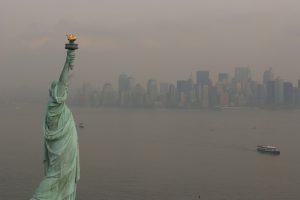 Ongoing wildfires in Canada have brought significant amounts of smoke to New York City, resulting in record levels of air pollution. This smoke presents a variety of health hazards, particularly for certain at-risk groups. However, it is important to note that high levels of smoke can affect anyone, even people who are otherwise healthy.
Ongoing wildfires in Canada have brought significant amounts of smoke to New York City, resulting in record levels of air pollution. This smoke presents a variety of health hazards, particularly for certain at-risk groups. However, it is important to note that high levels of smoke can affect anyone, even people who are otherwise healthy.
Wildfire smoke in particular includes a mixture of gases and fine particles that can cause coughing, sneezing, eye and sinus irritation, and shortness of breath. In people with certain medical conditions, exposure to smoke may cause symptoms of those conditions to worsen. People who are at the highest risk include:
- People with lung diseases such as COPD or asthma
- People with cardiovascular disease
- Older adults and children
- Expectant mothers
Anyone who may be exposed to smoke should take effective measures to protect themselves. The Centers for Disease Control and Prevention (CDC) recommend that you:
Reduce smoke exposure as much as possible: You should minimize the amount of time you spend outdoors for as long as poor air quality alerts due to the smoke remain in effect. While inside, keep all doors and windows closed; if possible, use an air purifier or make sure your air conditioner has high efficiency filters that can prevent fine particles from entering your home.
Wear a mask: If you must go outside while air quality alerts remain in effect, make sure to wear a mask. N95 respirators are ideal, as these offer the highest level of protection against airborne particles.
Consult your doctor: If you are at heightened risk of adverse health effects due to smoke, talk to your doctor about what you should do if your symptoms worsen and about any medication you should have on hand to manage them.
If you experience smoke-related medical problems, contact your doctor as soon as possible. If a medical emergency occurs, please dial 911 immediately.
All content of this newsletter is intended for general information purposes only and is not intended or implied to be a substitute for professional medical advice, diagnosis or treatment. Please consult a medical professional before adopting any of the suggestions on this page. You must never disregard professional medical advice or delay seeking medical treatment based upon any content of this newsletter. PROMPTLY CONSULT YOUR PHYSICIAN OR CALL 911 IF YOU BELIEVE YOU HAVE A MEDICAL EMERGENCY.
